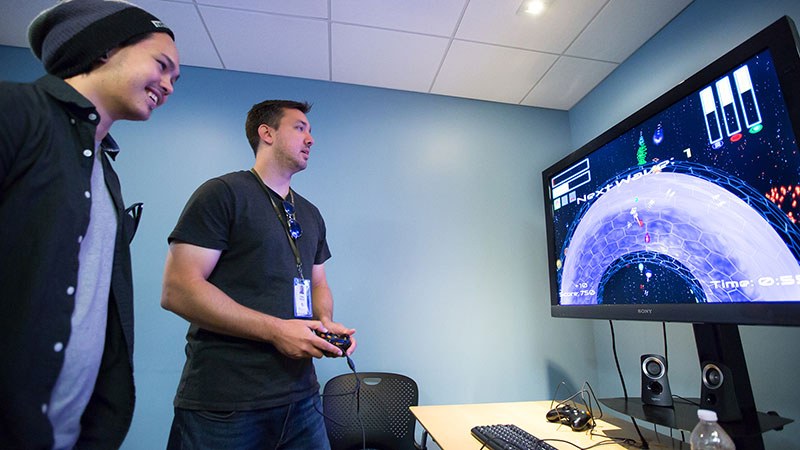Full Sail
How to Succeed in the Game Design Master's Degree Program
In the U.S., video games are a multi-billion-dollar industry, according to research from Forbes. And as the industry's revenue is forecasted to increase, so are the job opportunities. That said, finding work at a game design studio is no easy task – companies want employees who have technical skills, gaming experience, and dedication.
The Game Design master's degree program prepares students for real-world work in the game industry. In the 12-month online or on-campus programs, students will take courses in production, user experience research, and game design to build their skills. In addition, they will take part in the capstone process, where students earn a spot to join one of several labs that allow them to build a portfolio in their discipline of focus.
For campus and online students there are two different game labs to apply to, where they can work in a team to create and ship games. There is also a thesis option that requires a significant body of research writing and a linked game project. For campus students we have a user experience track where students can work in a state-of-the-art facility, and there is a bachelors production partnership and the Extended Reality track, both of which involve master’s students working as producers for undergraduate student teams. For online students there is also a human factors research track for those passionate about user experience.
"Students who take full advantage of the opportunities offered by this program will gain portfolio pieces supporting their career goals. For campus students that includes practical experience in studio and lab environments, and virtual asynchronous contribution to studios and labs for online students. For either program, there are valuable networking opportunities to be had," says Rob Catto, Full Sail's Game Design master’s program director.
Here are some of the traits and skills you need to bring to the table – or in this case, the studio – to succeed in the Game Design program:
Before entering the Game Design program: You should have practical experience in game development – programming, 2D art, 3D art, or game design. "This is not a degree for fans of games, this is a degree for people who are passionate about making games," Catto says. Before entering the program, you'll ideally have worked on a game from start to finish – it's okay if it was on an amateur level; it doesn't have to be a professional release.
Adds Catto: "Students should be strong readers and communicators – in both spoken and written form – and well-versed in the approaches and terminologies of the industry. An ability to conduct yourself politely and professionally is vital for success within the program and in the industry post-grad."
Be Ready For: Students can expect courses in user experience, production methodologies, game design, and more. Throughout the program students will design, prototype, and develop games. Depending on their selection of online or on-campus degree programs as well as capstone projects, students will have the opportunity to work on student or internal studio game and simulation projects, conduct user experience research on games in development, and manage clients. Students also have the opportunity to take part in networking events and game jams on campus. A twelve-month master’s is a full-time job, so be prepared to spend 35-40 hours per week, minimum, on your educational efforts. The bottom line – you've got to be ready to live and breathe gaming while you're enrolled in Full Sail for a year.
"This is a demanding program, with high expectations for both academic and applied performance," Catto says. "Our capstone options are all interviewed positions, so students must prove that they'll be able to contribute to a track to get their first choice."
Some other traits great Game Design students have are determination and focus, an ear for feedback, the ability to understand and speak the language of the game industry, and great time management skills, which is one of the most important elements of being a successful Full Sail student. The university's accelerated track means you're getting a master's degree in one year instead of the typical two. It's a huge benefit – you'll get a head start in the industry – but it definitely requires commitment and organization.
Post-Graduation: Many Full Sail Game Design master's grads have gone on to work for major game studios or develop their own indie games. Grad Ari Patrick is a Senior Producer at Epic working on the Fortnite franchise; Juliana Goriounov is a Game Designer at Ubisoft, working on the Far Cry and Assassin's Creed series; and Paul Heath is a Senior User Experience Project Manager at Epic Games. The Princeton Review has cited Full Sail as a top graduate program for Game Design for several years running.
More questions? Check out the Game Design degree page or call an Admissions Representative at 800.226.7625.
Whether you’re ready to apply or just want to learn more about Full Sail University, our Admissions Representatives are here to help. Call us or request more information.
